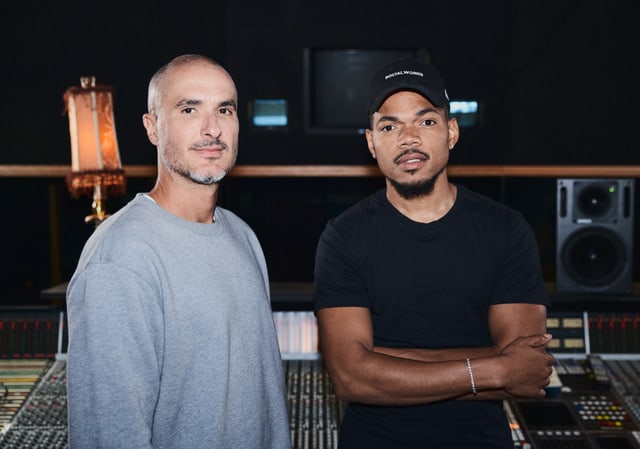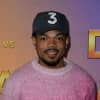
Before the release of his debut album The Big Day, Chance The Rapper sat down with Beats 1 Radio’s Zane Lowe to discuss the processes behind the album, as well as faith, Kanye, marriage, and more. There’s a lot discussed in the 30 minute interview, during which Chance is hitting his vape for pretty much the entire time, but we’ve listened through to give you a run-down of the most important parts.
Chance was born a wife guy
A lot has been made of how “I love my wife igh” Chance has been over the past couple of weeks, and a good chunk of his interview with Zane covers, well, loving his wife igh. The chat begins with Chance explaining how he fell in love with his wife on-sight at age nine (“The first time I [saw] my wife, she was dancing at a party when we were nine years old”) and throughout, we hear constant references to marriage and how important his union is to him. Turns out that this high valuation of marriage was instilled in him from a young age. “I think I'm the type of dude who always thought I was going to get married,” he explains to Lowe. “My parents have been married my whole life.”
Later, Chance discusses the value of “finding out what’s the most important thing” in life, and Lowe mentions the beauty of Chance’s relationship with is manager Pat; Chance quickly responds by asserting “He’s not my wife,” explaining that “I only have one wife. You know what I mean? I only have one person that will always be the mother of my children.”
And Chance isn’t just horny for his own marriage — the Chicagoan discusses Gucci Mane’s union at length. “[Gucci] and his wife’s relationship is something that should be, I think, just revered by everybody,” he says. “He went to prison for a long time, and the person that handled all his affairs and kept his music going and kept his image out there … was his woman. He came out, he married her.”
Kanye helped Chance be open and proud about his faith — and he might actually be on The Big Day
Chance’s mentor and idol Kanye West doesn’t pop up on The Big Day as we were initially led to believe he would. Chance says that his Chicago elder still has a big part in his life, though, specifically around helping him embrace and understand his faith. “[Ye]… talks about being a light of the world. He talks about being somebody that can just openly be me,” Chance tells Lowe. “Ye had his meeting with God, his revelation. He does often reference me when he talks about it, and I think that’s important — I think fellowship is the most important thing, period. And if we can’t talk about faith, it’s like – why are we talking?”
Elsewhere, Lowe mentions that he thought he heard some Kanye backing vocals across The Big Day, to which Chance responds “I cannot say, but what I can say—“ before being cut off by Lowe, who says “Yes, he’s totally in there.” It’s unclear as to whether Kanye is actually on the record, but Chance’s caginess certainly adds another clue to the mystery of why Kanye is missing from The Big Day.
The Big Day is a concept album — the concept being that The Big Day is the greatest album of all time
“The concept was best album of all time. And that's not really a good concept to make music,” Chance explains to Zane around halfway through their interview. “If I was to find the greatest album sitting on the ground outside, what would it be? It would be made out of diamonds. It would be nostalgic but also futuristic. You can't have a greatest album of all time without a shit ton of love songs. All the best albums have love songs.”
Most of all, Chance explains, “you have to be able to dance to it. The best album of all time is not something I need to listen to with reading glasses.”
Did Chance pull off the ‘greatest album ever’ concept? Based on the glut of lukewarm reviews — The FADER’s review included — the answer is probably a resounding no.
Chance thinks his music is more nuanced than people give him credit for
Chance thinks his music is more nuanced than people give him credit for
In one of the interview’s more candid moments, Chance explains that he feels his music is darker and more nuanced than people think. “There’s a caricature of me that's like I only make happy songs or songs for babies and stuff like that. In fact, I make a lot of sad songs,” he explains to Lowe. “10 Day, and a lot of parts of it and Acid Rap were very reflective of when my homie passed and one of my homies died in front of me when I was 18 and I think I always just had a fear of the n***as that did that shit just obviously knowing who I am and just ... I always had a weird relationship with death.”
There’s a nihilist streak to Chance’s outlook on life too, it seems. “I spent so much time trying to keep my masters and keep ownership and keep everything. But without a doubt, for a fact, this applies to everybody, we're going to be dead or not in existence for way longer than you are in existence,” he explains to Lowe. “There will be a longstanding time when I'm not able to say shit about what happens with my music. The concept that I keep using of trading cards is that in a lot of situations your jersey is way more important to people than your actual body. You know what I mean? Like the memorabilia attached to you, the CD separate from the music itself, the way that you can sell it, is more important to a lot of people sometimes. It's not even just about the work.”
Chance has had to figure out his relationship with fame
Early on in the interview, Chance explains that, around the time he got engaged, he found that personal moments of his life were being broadcast to the world. “The first photos that came out of me proposing to my wife were posted by friends of mine and I don’t think that they knew it was impersonal,” he explained to Lowe. “There’s people that follow my friends that aren’t in the industry at all, and wait for things like that to happen and then they repost and repost until it makes it to The Shade Room.”
“My issue isn’t at all with fame. I understand what it is and I think I’ve understood what it was for a long time. So I have a great relationship with fame. I can manipulate it when I want. The issue is when it manipulates me,” he furthered. Later, he elaborated: “You get in a position where you reach success or really you're fighting for success for so long, you're trying to make it out there, and then you've reached that.”
“You say, ‘I want to be on SNL. I want to win a Grammy. I want to do this. I want to do that.’ And then you do those things, but all at the same time, the things that are really actually self-care are faltering further and further. The only thing that's still going to be there regardless is your family.”
Watch the whole interview, including discussion on Chance's status as an independent artist and his collaborations with En Vogue and Randy Newman, below.
Listen to The FADER's weekly playlist of songs you need in your life


